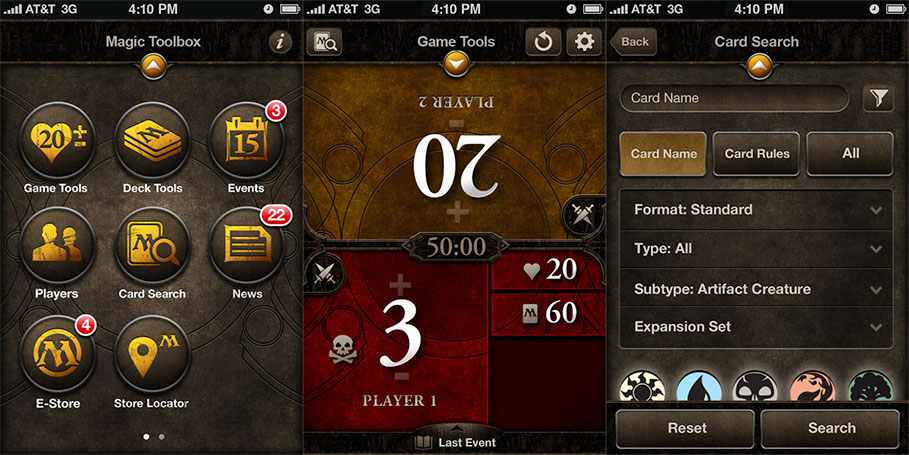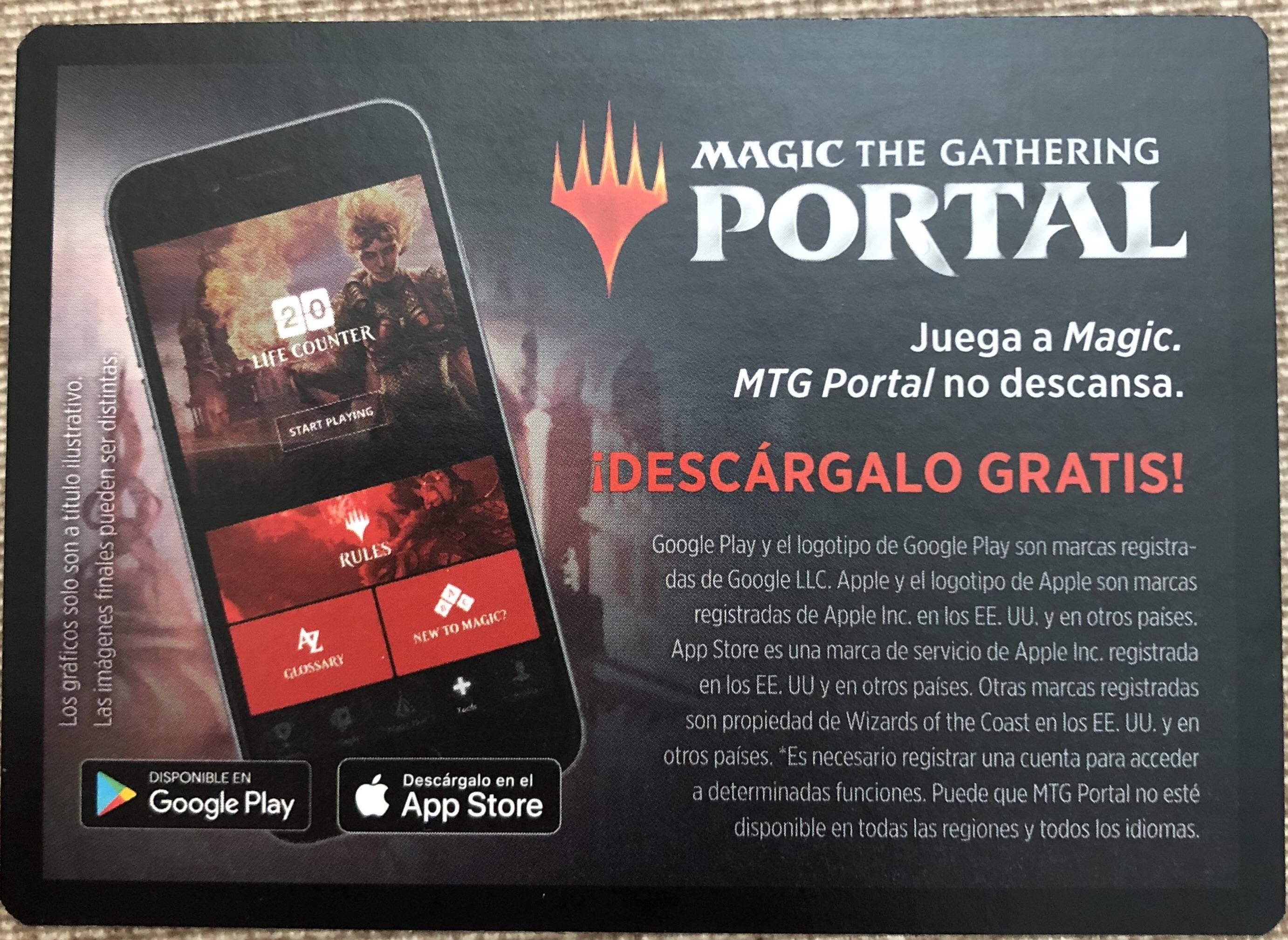Today, Wizards of the Coast released the official Magic mobile app, Magic: the Gathering Companion, in Open Beta. It is available on both iOS and Android in all languages that Magic is currently published in.
UPDATE: The iOS version of Companion is only available through the TestFlight app, which you must download first.
Magic’s Official Companion Mobile App
Companion launches with a single feature: a home tournament organizer. “The first set of functionality is admittedly narrow, and that’s by design,” Bill Stark, Digital Product Manager for Companion, told Hipsters of the Coast. “Our research in the marketplace indicated that being able to run an event was a problem players faced that they felt there wasn’t already a good solution for.”
“Compare that to life trackers, which have millions of downloads online,” he continued. “I knew we wanted to start by solving a unique problem instead of trying to break into a crowded marketplace.”
Read our full interview with Bill Stark about Companion’s vision, development process, and feature set.
By limiting themselves to a single feature, the Companion team can focus on delivering on Stark’s vision for the product. “My goal for Magic: The Gathering Companion is for a new player to run into a Magic player that finds out they don’t have Companion installed and immediately be told, ‘Holy cow, you’ve GOT to get the companion app!’”
Building that “must have” sense for Magic players requires creating value by solving issues that they actually face. “[A] big part of the drive for early features in Companion is re-imagining the organized play landscape to get us out of what our UX team calls ‘paper and yelling’ for finding information like pairings, standings, and reporting results,” Stark said. Instead, he wants Companion to allow players to find that information themselves on their mobile device.
Launching with just the home tournament organizer doesn’t mean MTG Companion will stay a single-feature app. “After we get the tournament experience really dialed in for Magic: The Gathering Companion, we’re going to shift to something I call the ‘daily engagement features,’” Stark said. “I’m not ready to go in too much detail on those just yet, but our current trajectory would have us start delivering some of those later this year.”
But those features will be focused on tabletop players, not those on MTG Arena or Magic Online. According to Stark, “we’re focusing primarily on…tabletop players because it’s an area whose needs aren’t being served as well as they could be.”
The release of Magic: the Gathering Companion comes over seven years after Wizards of the Coast released their first official mobile app, Magic: the Gathering Toolbox.

Screenshots show the main features of the Toolbox app.
Toolbox had a large feature set: a life total tracker, deck builder, and store locator, as well as card search, news, and a store. It was updated for Avacyn Restored and then later removed from the App Store.
Companion was Developed In-House at Wizards
The team behind Magic: the Gathering Companion is entirely in-house at Wizards of the Coast and also worked on the new Store and Event Locator, the Beta for which was revealed earlier this year.
Development of the front-end (the part visible to the user) of Companion began three months ago, though the services it relies on, like the new Wizards Event Reporter, have been under development since the end of last year.
“We built the app with a host of technologies you’d find consistent with iOS and Android products, but the key design constraint from the technology perspective was building the app natively,” Stark said. This means that the team has developers that are writing two different versions of Companion, each in the language that Android and iOS run, rather than using a framework like React Native or Xamarin that would allow them to write a single app in one language and then translate it for Android and iOS.
Stark joined the team in late 2018 as the Digital Product Manager. In his role, he’s responsible for representing the voice of the customer and understanding what his users want, insights that he then uses to determine the product’s feature set and development process. “I’m the person guiding the vision of what the product is and if that product fails the buck stops with me,” he said.
Aside from his role as the Digital Product Manager for Companion, he is also responsible for the new Store and Event Locator as well as both the existing and new Wizards Event Reporter.
Stark originally joined Wizards of the Coast as an intern in 2008 after retiring from the Pro Tour. He has held positions at Wizards: in Magic R&D (now the tabletop studio), the Wizards Play Network team, both the MTG Arena and MTGO teams, as well as the event coverage team.
What About Magic: the Gathering Portal?

If a home tournament organizer sounds familiar, it’s because it was originally announced as a part of the Magic: the Gathering Portal mobile app, which was originally supposed to be released in 2018. Some other features Portal was advertised to include card and rules lookup, life total tracking, Magic news, and social features—a very similar feature set to Toolbox.
But MTG Companion isn’t Portal. “The Portal team did an awesome job on answering a lot of the questions we needed to understand about building a great companion app,” Stark said, “But in the end, the actual product from that effort fell short of where we needed it to be for players.”
A New Community Feedback-Driven Development Process at Wizards
Wizards says that today’s launch of Magic: the Gathering Companion does not mean that the app is complete. Instead, the team wants to deliver an “MVP” (minimum viable product) and then iterate on the app and its features in public in order to collect community feedback and allow that feedback to guide the development process.
“[Companion has] been through an internal alpha playtest at Wizards with the hundreds of gamers on staff providing feedback. Now we want to see what thousands of Magic players around the world can offer up as feedback to broaden our perspective,” Stark told Hipsters. The most direct way to provide that feedback is an email link listed directly in the app’s menu.
The app’s development process has been set up with user feedback in mind. Stark is running the team with what is known as agile project management, which will allow the team to iterate quickly based on player feedback.
“We run on two-week sprints, which means that every two weeks we roll out new features and bug fixes for Magic: The Gathering Companion,” Stark said. “That means community feedback can be consumed quickly and turned into action in a short time span… [W]e expect to be updating things for end users every two weeks while continuing to build new ‘big’ features behind the scenes.”
But a development process that integrates community feedback isn’t without its own risks. In fact, Stark acknowledged that one of the biggest challenges in developing Companion is his fear “that this agile method of developing with feedback from users will backfire.”
“[Though] I worry about managing reactions from a passionate fanbase, I’m totally confident that putting the application in front of users to get their feedback early on is key to our success in the long-term,” he says. And, overall, he’s “really happy that we get to release it and iterate in front of users instead of trying to guess at what we could be doing better. We still face lots of challenges and there’s no greater reality check in software development than putting your product into the hands of users.”
Don’t miss our full interview with Bill Stark about Companion’s vision, development process, and feature set.

